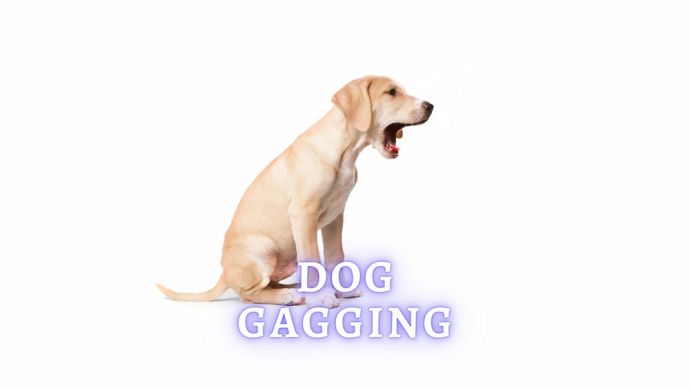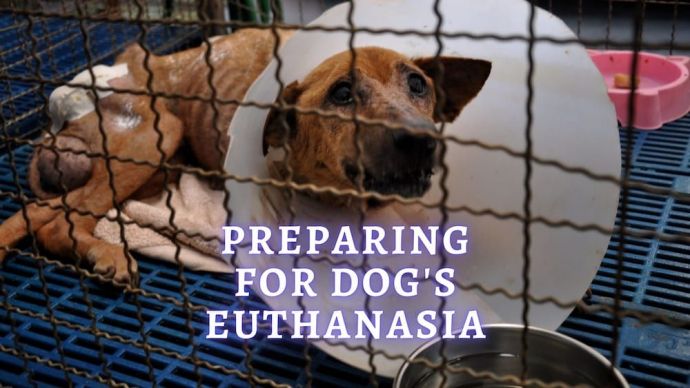Dog Keeps Shaking Head: Why Does My Dog Keep Shaking His Head?
Written by:
Author: Vicki Smirnova
Vicki Smirnova is a professional writer and editor who adores animals and helps readers get along well with their pets. She has been working in digital media for more than 5 years and has great experience writing content about lifestyle, including pets. Vicki specializes in dog health and nutrition, cat feeding, dog training. She is an aquarium lover and is passionate to write about fish care at home. Also, Vicki headed several websites and worked as a news editor.
View all 244 articlesLearn about our editorial process and veterinary review board.
Reviewed by:
Veterinary review
by Dr. Sara Ochoa
Dr. Sara Redding Ochoa is a veterinarian with many years of experience and higher education. During her time in veterinary school she was able to learn form some of the most well-known veterinarians from all over the world. Sara lives happily with her husband Greg and her babies Ruby the schnoodle, and Bam-Bam her bunny. Dr. Sara Redding Ochoa has a passion and love for animals that makes her a wonderful asset to our team.
View all 13 articlesLearn about our veterinary review board
Viewed: 328
Updated on: 11/11/2021
Shaking the head is one of the signs of violations of the pet’s body. The factors that provoked this behavior may be minor damage or an ear mite. In severe cases, the cause of shaking the head is a foreign body stuck in the ear or an inflammatory process of the inner ear. This can provoke the development of pathological changes in the membranes of the brain.
Another reason for this behavior of the dog is the active growth of microflora colonies in the ear. A favorable environment for the growth and reproduction of various bacteria and fungi is created in the canal. There is a strong itching that causes discomfort to the dog. Pet starts shaking her head and ears, trying to scratch the itchy area.
The main task of the owner is to detect the presence of characteristic symptoms promptly and contact a veterinary clinic for help. Veterinarians will diagnose the pet, which will help to identify the real cause of discomfort, itching and pain in the ears, as well as select the appropriate treatment.
Does shaking head hurt dog?
When a dog shakes his head, it does not always indicate the development of otitis and inflammatory processes in the ear canal. There are some other diseases associated with injuries of the ear canal and the animal’s head.
To help the pet faster, it is necessary to establish the exact cause of the shaking. Diseases that provoke the development of a pathological process in the auricle are characterized by head shaking and other symptoms. A sick dog may whine, try to rub against the carpet or bed. Subconsciously, the animal tries to ease the pain it feels.
What Makes a Dog Shaking Head Frequently?
1. Ear Infections
Pathogenic bacterial and fungal microflora. In physiological conditions, the ear canal of pets is inhabited by a large number of conditionally pathogenic microorganisms. This means that the dog’s normally functioning immunity copes well with various pathogenic factors, restraining the growth of microflora. With disorders in the body, bacterial colonies begin to multiply actively, spreading over large areas and cause an inflammatory process. Characteristic signs of bacterial otitis are that the dog shakes his head and scratches the affected ear, trying to get rid of the irritating factor. Untimely treatment leads to dangerous complications in the form of damage to the inner ear and inflammation of the membranes of the brain.
2. Ear Mites
This type of disease is the most common cause of a dog’s symptoms, such as itching and ear pain. The reason of the development of the pathological process is a microscopic parasite that penetrates under the skin. The dog’s ear is the most suitable habitat for tiny mites. There are favorable conditions – temperature, humidity, and lack of microcirculation of air. The ear mite feeds on particles of the dead epidermis, lymph, blood, and earwax. In the process of its vital activity, the tick chews through the passages as it progresses, provoking itching and discomfort in the auricle. Signs of otodectosis are that the dog is constantly scratching his ears, squeezing them. An unpleasant putrid odor can be heard from the ear canal of a sick animal, indicating the development of the disease, and a specific brown exudate with an unpleasant odor is also released.
READ MORE: How to Treat Ear Mites in Dogs? (Vet Advice)
3. Dirty Ears
Improper ear hygiene. In the ears of animals, there is sulfur – a lubricant for the ear sections. Pathogenic bacteria can develop in it. If you do not clean your pet’s ears, then sulfur can accumulate so much that it leads to the formation of a sulfur plug. Clean the dog’s ears regularly. It is better to entrust this to a specialist. If you clean the dog’s ears yourself, then do not use a cotton cloth to clean your pet’s ears. The sulfur plug can be removed by the animal itself, using special hygienic lotions. A lotion is instilled into the ear, wait a couple of minutes, massaging the base of the ear, and then removing the sulfur. If you see that after the procedure, the amount of sulfur in the ears has not changed and it still bothers your pet, you need to contact a veterinary clinic.
4. Allergies
Allergens that have entered the dog’s body cause the histamine. As a result of increased vascular permeability, an inflammatory process may begin in the canine. Most often, allergic otitis affects both ears at once, but sometimes inflammation occurs only in one. They will look inflamed, and when the owner tries to look inside, the dog may whine, snap and try to hide or run away. As a rule, the treatment of allergic otitis is complex and will be prescribed by a doctor individually for each dog.
READ MORE: The 10 Best Dog Food for Allergies: Review & Buyer’s Guide
5. Hypothyroidism
This is a violation of the thyroid gland in a dog. Signs of hypothyroidism — weight gain, loss of muscle mass, lethargy, slowing heart rate, infections of nails and ears.
6. Water
The liquid into the ear canal area causes unpleasant sensations, sometimes even causing pain. Trying to get rid of the discomfort, the dog shakes his head. Water gets into the ear when hygiene procedures are violated, during long walks in the rain, after swimming in a pond. The greatest danger to the ears of dogs is sea and ocean water and water saturated with various chemical elements. In order to eliminate the possibility of developing uncomfortable sensations in a pet after water procedures in the bathroom or after bathing in an open pond, it is necessary to immediately dry the ear canal from excess moisture accumulated there.
7. Foreign Objects
Grass, plant seeds, or an insect may accidentally get into the dog’s ear. A foreign body gives the dog discomfort – the dog persistently rubs his ear with his paws. It is necessary to examine your pet as soon as possible or take the pet to the veterinarian. With the prolonged presence of a foreign body in the ear, serious inflammation may develop, which will require long-term treatment. [2]
8. Tumors or Growths (such as Ear Polyps)
When a dog has an earache and shakes his head, the reason may cause a neoplasm. In clinical veterinary practice, growths on the inside of the ear canal are diagnosed – papillomas that provoke the onset of narrowing of the canal.
9. Otitis
Otitis can be triggered by the development of bacteria, fungi, or both. It may be a skin reaction to injury, parasites, allergen. It is most often accompanied by severe swelling, inflammation, pain, itching, and discharge with an unpleasant odor from the ear. The treatment is complex, special preparations are used in the form of drops and solutions, antiseptics and anti-inflammatory drugs. Special attention is paid to the search for the main cause that caused such inflammation. [1]
10. Ear Vasculitis
Vasculitis in dogs is an inflammatory process that affects the vascular wall. Vasculitis can be primary or secondary. The cause of secondary inflammation of the vessels are infectious lesions, neoplasms, allergic reactions, etc. In the early stages, the disease is manifested by redness, which does not fade after pressure. With the progression of pathology, the appearance of ulcers and erosions spreading towards the base of the ear is noted. The cause of vasculitis can be frostbite, damage to the integrity of blood vessels as a result of insect bites, aggressive exposure to certain medications, allergies, and tick lesions.
11. Hematomas
This is the accumulation of blood between the cartilage of the ear and the skin. It rarely causes itching, but it causes obvious discomfort to a four-legged friend. With this disease, the dog’s ear looks like a hot balloon. Often, a hematoma of the auricle can occur due to itching, when the dog often scratches his ears by hitting the auricle with his paw. The veterinarian can also put a collar on your dog to prevent scratching of the ear and further damage to it.
12. Improper nutrition
The development of inflammatory processes is provoked by sweet dishes given to pets in the form of encouragement, as well as smoked meat. If the dog scratches his ears, the cause may be food allergies, provoking itching and further inflammation in the canal.
Could It Be a Seizure?
If the dog shakes unnaturally not only with his head, but also with his whole body, this may indicate convulsions. Convulsions are an uncontrolled, involuntary contraction of a muscle or a group of muscles. Very often they are secondary signs. One of these causes is hypoxia or anoxia (insufficient supply or temporary lack of oxygen flow to the brain) caused by respiratory or cardiac disorders. Seizures may be associated with low blood calcium (hypocalcemia) or glucose (hypoglycemia), kidney disease, liver disease, diabetes, as well as postpartum titania (a disease that occurs during lactation after childbirth).
When to See a Veterinarian?
Having noticed one of the characteristic symptoms described above, the owner should contact a veterinary clinic. This will allow you not to miss the development of hard disease and save the pet’s life, relieving him of pain and discomfort. When contacting a qualified veterinary specialist, the animal is thoroughly diagnosed to determine the exact cause that provoked the disorders in the animal’s body.
Treatment will vary depending on the factors that cause the pathological process in the body. Bad odor from the ear canal, indicates most often bacterial or fungal otitis. Courses of antibiotics or antimycotic drugs are prescribed. The dosage and duration of the course of treatment is determined by a veterinary specialist.
If the dog shakes his head due to otitis on the background of food allergies, the veterinarian prescribes specific antihistamines that eliminate itching and discomfort, as well as medications that strengthen the body’s defenses. An important role is played by the correct diet for the patient, which allows minimizing the risks of developing allergic reactions in the future.
Early diagnosis of head shaking in dogs is Important. The lack of timely treatment in advanced cases can cause the death of the animal. Self-medication is unacceptable, as it rarely gives positive results, and may lead to complications. After self-treatment, it is more difficult for a veterinarian to diagnose and treat. [3]
The best way to fight the disease is its prevention. To prevent the dog from having otitis due to parasitic diseases, treat the pet from fleas and mites in time. If you know that the dog is prone to food allergies – carefully follow the diet and have a conversation with all family members so that they do not feed it from the table. Keep your pet’s ears clean – clean them regularly.
How to Clean Dog Ears?
For any hygienic procedures with dog, the pet must be in a good mood. It is very important to do everything carefully and patiently to not cause negative emotions in the dog.
- Fix the pet.
- Сaress the dog, making the procedure pleasant and calm.
- Lift ear and perform an inspection.
- Moisten a cotton pad in lotion (or herbal decoction) and remove dirt. Or use special wet sanitary napkins designed to clean them.
- Wipe it with a dry cotton pad.
- Praise your pet for his endurance and give an encouraging treat.
READ MORE: Best Dog Ear Cleaners
FAQ
What should I do if my dog keeps shaking his head?
If you notice that your dog shakes his head for a long time, it is recommended to consult a veterinarian. Which will establish the exact reason for this behavior. You can also independently inspect your pet’s head and ears for the presence of inflammation, foreign objects.
How do I know if my dog has an ear infection?
The presence of an ear infection is easy to determine by the appearance of a characteristic odor. If the dog’s ears are red, has an unpleasant smell, or there are wounds, it is urgent to contact a veterinarian to get qualified help.
How can I soothe my dog’s itchy ears?
Treatment should be directed to the cause of inflammation and itching. For each case – individual treatment, which should be prescribed by a veterinarian.
Why does my dog keep scratching his ear and shaking his head?
If the dog scratches his ears, the cause may be food allergies, provoking itching and further inflammation in the ear canal, otitis, immune system problems (vasculitis). This behavior can be provoked by foreign objects in the dog’s ears, parasites and excessive pollution.
Article Sources:
- Brooks, Wendy. “Ear Infections (Otitis) in Dogs.” Veterinary Partner, veterinarypartner.vin.com/default.aspx?pid=19239&id=4951507.
- Weir, Malcolm, and Ernest Ward. “Ear Mites in Cats and Dogs.” VCA Animal Hospital, vcahospitals.com/know-your-pet/ear-mites-otodectes-in-cats-and-dogs.
- “8 Risks of Treating Your Pet at Home.” PetMD, 8 Jan. 2018, petmd.com/dog/care/8-risks-treating-your-pet-home.
 Dog Care Can Dogs Eat Brussel Sprouts? Benefits and Risks of Feeding Your Dog Brussel Sprout
Dog Care Can Dogs Eat Brussel Sprouts? Benefits and Risks of Feeding Your Dog Brussel Sprout - 168
- 0
 Dog Veterinary Tips Why is my Dog throwing up: Causes and Preventing (Veterinary Advice)
Dog Veterinary Tips Why is my Dog throwing up: Causes and Preventing (Veterinary Advice) - 23424
- 5
 Dog Care Why Is My Dog Bleeding From Its Butt? Causes and treatment of rectal bleeding in the dog
Dog Care Why Is My Dog Bleeding From Its Butt? Causes and treatment of rectal bleeding in the dog - 22076
- 0
 Dog Care My Dog Keeps Scratching His Mouth: Reasons Why Your Dog Scratching Face
Dog Care My Dog Keeps Scratching His Mouth: Reasons Why Your Dog Scratching Face - 17561
- 1
























